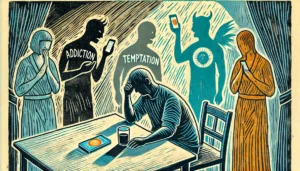READ IT TO ME: Click play to listen to this post.
Almost everyone has had the experience when they paid for something and got nothing or at least something that was very disappointing. It could have been an investment, a vacation rental, or some other purchase. When this happens we usually feel ripped off, jipped, and unjustly treated. Most addicts live life with this experience churning in their guts. Whether it is abusive treatment in childhood, illness, a bad break at work, or feeling misunderstood by a partner. Life sucks because you think you put in somethin’ and got nothin’ back. The truth is addicts are not the only people who get stuck here. How many stories have you heard from athletes who have described putting their heart and soul into their sport only to feel unfairly treated, undermined by injury, or otherwise ripped off by outside controls? There are countless numbers of people who flounder in life because they put somethin’ in and seemingly got nothin’ out.
Anxiety and fear escalate to unbelievable levels when you cannot control the outcome of your effort. You tried so hard and did everything experts told you to do, yet, still the results are drastically disheartening from what you hoped for. Putting something in and getting nothing out leaves you feeling empty, dissatisfied, and angry.
How do you address these average experiences in life that are so common to all? Children can be our best teachers. Kids demonstrate the resilience, creativity, and adventure so necessary to addressing deep disappointment. We have all seen a toddler have more fun playing with the wrapping paper and the box than the gift inside. When a picnic or a trip to the park gets rained out, gloom and disappointment turn to fun and adventure with a creative make-believe game at home. Kids show adults how to become good at making adjustments. It seems like kids who have less material things often have so much more imagination than kids who have it all.
When I was little we didn’t have a lot of privileges but we did have an imagination. We had a lot of kids in our block who played sandlot baseball. We had epic contests. We lived half a block from Lincoln School which had a baseball diamond. Some days we would play all day long. We would pretend to be different National League teams. We would impersonate different stars on the teams of the day. I loved pretending to be Willie Mays at the plate, with his tight compact stance. I tried to mimic it. I also loved pretending to be Juan Marichal when I pitched. He had this crazy delivery style. Many times he would famously kick his front leg high in the air in the process of throwing the pitch. l loved trying to do this. The problem was that when I did it, I could never get the ball over the plate. I was always high and inside. There were times I hit the batter. When my brother Steve was up, he would get pissed and throw the bat at me when I hit him. I don’t know why I didn’t try to mimic Sandy Koufax. He was great in the day and I was a southpaw, just as he was. I just liked the flair of Marichal’s delivery. Every kid who played would pretend to be somebody.
When we played we never really played at Lincoln school because in our heads we were dreaming of playing at Wrigley, the Chavez Ravine or Yankee Stadium. Most of the guys who played pretended to announce the game, too. So you would see these guys at the plate or in the outfield, appearing to be talking to themselves but the truth was they were just announcing the game, usually trying to be Vin Scully, Harry Caray or Jack Brickhouse!
A few years ago my wife and I went to Yankee stadium to watch the Yankees play. We had privileged seats on the front row next to the visitors dugout. We got all the hot dogs and non-alcoholic drinks free, just for sitting in those seats. It was amazing! Yet, sitting next to us was a family with 2 kids who sat through the whole game playing on their iPhones! They never really noticed the game in Yankee Stadium that I dreamed of playing in as a kid! Kids with less sometimes have a lot more because they are forced to engage their creativity. They have learned to make something from nothing.
Here are a few reflections about making something from nothing:
1. When faced with disappointment, always remember that attitude is everything. Usually, when things don’t go our way we begin to complain and grumble. Everyone is vulnerable to this reaction. Yet, criticism and complaints take what is and make it even less. Most of us know this. The irritation about being ripped off and experience of dashed expectations is frequently too much. Rather than to adjust and create something good out of something bad, many choose to address this average experience with addictive demand and a lot of bluster. You want to demand your rights for the results that you thought you had negotiated for. We live in a very litigious age where if someone doesn’t get what they thought they deserved then they sue for it. Most people who go down the avenue of lawsuits usually lose even when they win. It has become a strategy of large corporations who have deep pockets being able to outlast dissatisfied plaintiffs who are determined to sue for their rights. It is not that someone should be against a lawsuit when unfairly treated, it’s just that financial compensation usually doesn’t satisfy or help the plaintiff who was wronged create something from nothing. Oftentimes, the litigation and the focus on the wrongful experience still leave the person with a lingering disappointment that they are unable to let go of. It is important to recognize when things go wrong, attitude is everything.
2. Practice being grateful. Gratitude is like cultivating and preparing soil to grow plants. It prepares your heart for creative responses to the challenges of addiction and other life problems. So many people talk about gratitude. Most recovery plans include an emphasis on being grateful and rightfully so. Gratitude isn’t just a thought. It is a lifestyle that must be conditioned every day. When you are old and you wake up grumpy because every bone in your body hurts, you must train in grateful thinking. When you get tired of being an addict or a mom or a dad you must condition your heart and mind with gratitude. The need to practice gratitude stares at you every day in the mundane average experiences that everyone faces. Those who practice grateful living experience the secret of peace and satisfied living. You don’t need to pay a lot for therapy to learn this practice. It is a daily ongoing practice that lightens the load in average common challenges we all share.
3. Surrender activates resilience. To be resilient you have to let go of the whine, the complaint, and the criticism of the moment of challenge you encounter. You may need to take a walk, cuss a blue streak, scream in a pillow, or express your frustration in a million other ways. However you do it, you must surrender and let go of the pent-up feelings of anger, resentment, and frustration about the injustice and unfair treatment you have experienced. If you don’t you will stay stuck with a bad attitude and the results that come with it.
4. Acceptance unleashes creativity at the moment and transforms drudgery into a meaningful adventure. When you don’t let go of feeling you have to be right, your heart closes to other options of thought and you stiffen with rigid dualistic thinking. Surrender in a difficult situation opens the door to acceptance. Acceptance fosters adaptability and you are able to convert the moment of disappointment into adventure and challenge and bring meaningfulness into mundane irritation and disappointment.
Addicts who create long-term sobriety and experience satisfying serenity have learned to make somethin’ from nothin’. It is a life skill that transforms disappointments and setbacks into meaningfulness in average happenings of everyday living.



